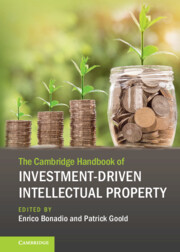Book contents
- The Cambridge Handbook of Investment-Driven Intellectual Property
- The Cambridge Handbook of Investment-Driven Intellectual Property
- Copyright page
- Contents
- Figures and Tables
- Contributors
- Foreword
- Introduction
- I Creativity, Pluralism, and Fictitious Narratives
- Part I Science, Technology and Industry
- Part II Culture and Entertainment
- IX The Press Publishers’ Right under EU Law
- X Copyright in Published Editions
- XI Protecting Sound Recordings
- XII Copyright in Broadcast Transmissions and the Investment-Protection Rationale
- XIII Copyright Protection of Previously Unpublished Works
- XIV Cinematographic Works and Copyright in Nollywood
- Part III Signs, Images and Designs
IX - The Press Publishers’ Right under EU Law
Rewarding Investment through Intellectual Property
from Part II - Culture and Entertainment
Published online by Cambridge University Press: 16 March 2023
- The Cambridge Handbook of Investment-Driven Intellectual Property
- The Cambridge Handbook of Investment-Driven Intellectual Property
- Copyright page
- Contents
- Figures and Tables
- Contributors
- Foreword
- Introduction
- I Creativity, Pluralism, and Fictitious Narratives
- Part I Science, Technology and Industry
- Part II Culture and Entertainment
- IX The Press Publishers’ Right under EU Law
- X Copyright in Published Editions
- XI Protecting Sound Recordings
- XII Copyright in Broadcast Transmissions and the Investment-Protection Rationale
- XIII Copyright Protection of Previously Unpublished Works
- XIV Cinematographic Works and Copyright in Nollywood
- Part III Signs, Images and Designs
Summary
The press publishers’ right available under Article 15 of Directive (EU) 2019/790 on Copyright in the Digital Single Market (the ‘DSM Directive’) is one of the most recent additions to investment-driven intellectual property rights under EU copyright law. The right was introduced with a view to address the dramatic changes in the creation, distribution and consumption of news online. With the advancement of digital technologies and the Internet, news is no longer solely available directly from press publishers through their print editions and news websites but is increasingly accessed via other sources, such as news aggregators and social media platforms. The changes in news consumption trends have resulted in a drop of the revenues of press publishers since 2000, a progressive decline in the circulation of printed newspapers,1 and a dramatic increase of consumption of online news content. Because of these changes, the revenues and advertising sales of press publishers have substantially dropped despite their efforts and investment in making news accessible. It is to reward these efforts and this investment that a sui generis press publishers’ right was introduced initially at the level of EU Member States, such as Germany2 and Spain,3 and was later included in Article 15 of Directive (EU) 2019/790 on Copyright in the Digital Single Market. The right was envisaged as one that would improve the bargaining power of press publishers when negotiating licensing deals with online services and web platforms that re-use their content.
- Type
- Chapter
- Information
- Publisher: Cambridge University PressPrint publication year: 2023



